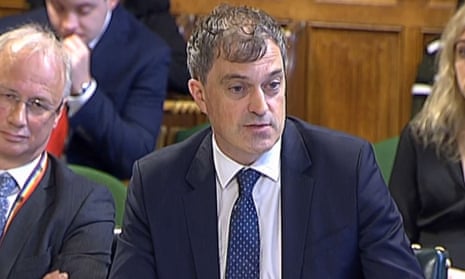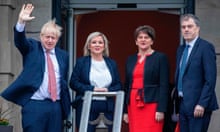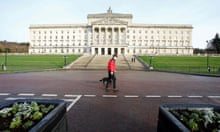Unionist MPs have branded the government’s approach to Northern Ireland in the Brexit talks “despicable” and a “betrayal”.
In his first appearance before the Northern Ireland affairs select committee, Julian Smith, the Northern Ireland secretary, was questioned about plans to require businesses selling or transiting goods from the region to Britain to complete special paperwork in order to trade post-Brexit.
Smith said the checks would be minimal and the focus should be on the “great opportunities” awaiting Northern Ireland.
He said the government would work with businesses to ensure the withdrawal agreement bill would as far as possible allow unfettered trade between Northern Ireland and Britain.
But Ian Paisley Jr, the DUP MP for North Antrim, said it was disgraceful to expect any business to complete paperwork for goods being sold in “our country, not a foreign country”.
In a tense exchange, he asked Smith where he lived. When Smith told him he lived in North Yorkshire and London, Paisley said: “If you had to move goods from North Yorkshire to London and have to fill in a form, you’d feel pretty aggrieved about that. We are in the same country. It is disgraceful.”
After Boris Johnson told MPs during prime minister’s questions that there would be no checks between Northern Ireland and the rest of the UK, his spokesman sought to explain that the customs regime would instead be a “minimal administrative process”.
Quick GuideThe 'Irish Sea border': what does it mean for GB business?
Show
Why is a barrier in the Irish Sea being discussed?
In agreeing a deal to guarantee the Irish border remains invisible, with no checks fuelling inter-community tensions, the UK is moving the border to the Irish Sea.
If all goods entering the island of Ireland are checked before arrival for standards and tariffs, then cross-border trade can continue to flow unimpeded.
It will also protect the single market and reduce the chance of suspect goods making their way to the continent via Northern Ireland and the republic.
How much trade goes from Great Britain to Northern Ireland?
Around 450,000 trailers arrive in Northern Ireland every year, transporting everything from cars to soft cheese to school shirts.
Trade and services purchased from Great Britain were valued at £13.4bn according to the latest data, £11bn of that representing goods.
About 70% of goods purchased by Northern Irish businesses from Great Britain are destined for the high street and are largely food to Tesco, Sainsbury’s and other supermarkets, clothing and white goods, cars and motorbikes.
Who will the new Brexit terms impact?
All companies moving goods to Northern Ireland. Business representatives believe the big companies such as supermarket chains will be able to put systems in place to deal with any checks but will be looking for government assistance to help smaller businesses.
The extent and type of checks will not be clear until the detail of the deal emerges, but essentially they fall into two categories: tariffs and VAT. Excise duties also apply but will not trouble most importers as they generally apply to a limited amount of controlled goods including alcohol, cigarettes and fuel.
Customs declarations apply for both exports and imports and, although the trade is domestic, for the purposes of this version of a Brexit backstop, the checks will be made on behalf of the EU. It is concerned about goods from a third country leaking into Ireland and therefore the single market.
Will there be a border through the Irish Sea immediately if parliament votes for a deal?
No. The discussion over the Irish border is part of Boris Johnson’s alternative arrangements to the controversial backstop. It will only be triggered if the UK and EU do not seal their main trade deal before the end of the transition period.
Lisa O'Carroll Brexit correspondent
He said: “The deal explicitly allows the UK to ensure unfettered market access for goods moving from Northern Ireland to the UK. We don’t intend to carry out checks on these movements of goods. There will be a minimal administrative process provided electronically.”
However, Johnson’s spokesman declined to say what might happen if companies simply declined to fill in the forms given there was no process to check if they had been completed.
The Northern Ireland committee also heard that £15m of taxpayers’ money has been spent on Stormont politicians, including members of the legislative assembly (MLAs), since it collapsed in January 2017. MLAs are being paid almost £36,000 a year for not sitting, while the speaker of the chamber is being paid £56,000 a year having sat for one day in almost three years.
Sylvia Hermon, an independent unionist MP, said this was “absolutely outrageous”, and Smith admitted it was “unacceptable” but stopped short of vowing to cut the salaries. He argued it was best to focus on getting Stormont restored because the alternative – direct rule from Westminster – was worse.
The DUP had previously accepted that regulatory checks would be needed on goods moving from Britain to Northern Ireland as a concession designed to obviate the need for checks on the Irish border. The plans for checks on goods going the other way emerged on Monday.
Smith tried to offer reassurances but was laughed at when he said the latest chapter in Brexit was a “healing process”.
“This is healing process?” Hermon asked. “I think you should speak to some of the unionist parties if you think this is a healing process since the deal was brought home last Thursday. There has been considerable disquiet, anger, to put it mildly, amongst the unionist community,” she said.
Quick GuideHow is Boris Johnson's Brexit deal different from Theresa May's?
Show
The new Brexit deal is essentially the old Brexit deal with a new chapter on the protocol on Ireland and Northern Ireland and a few key tweaks to the political declaration. Here is a link to the full text.
The backstop is replaced
The backstop has essentially been replaced by a full stop whereby Northern Ireland remains aligned to the EU from the end of the transition period for at least four years. A change can only happen if it is voted on by the Stormont assembly.
Consent
Stormont will have a key role in future Brexit arrangements. And if there is cross-community support to remain aligned to the EU rather than the UK the consent will hold for eight years.
The arrangements in this deal will automatically kick in for a mandated four years if there is a breakdown in trade talks, so it remains a “backstop” but with a permanent tinge.
That four-year period will start at the end of December 2020.
Two months before the end of the four-year period, that is October 2024, Stormont will be asked to vote on whether to remain aligned to the EU in ways outlined by this deal or not.
Checks on border, ports and airports
Under the deal, the UK and the EU are “underlining their firm commitment to no customs and regulatory checks or controls and related physical infrastructure at the border between Ireland and Northern Ireland”.
Future trade deals
The EU and the UK will aim for a zero-tariff deal with unlimited quotas. The entire UK, including Northern Ireland, will be free to sign trade deals. The line in the political declaration that “the United Kingdom will consider aligning with union rules in relevant areas” in any future trade talks has been ditched.
Customs
Northern Ireland will remain legally in the UK customs territory but practically in the EU customs unions. There will therefore be no customs checks on the border but tariffs will be payable on certain commercial goods.
No customs duties will be payable on “personal property” being transited from Great Britain to Northern Ireland. That protects online shopping and all items bought for personal rather than commercial use.
Customs duties will be payable on goods imported from the UK for commercial use unless it can be demonstrated that the goods remain in Northern Ireland or are for personal use, as above.
A system of rebates will allow importers to be reimbursed.
West/east trade
The commitment to frictionless trade between Northern Ireland and Great Britain is restated.
VAT
EU law on VAT will apply in Northern Ireland.
Single electricity market
The island of Ireland is considering a single market for electricity so homes in Northern Ireland can get their energy from a supplier in Northern Ireland or the republic. There were fears this could be disrupted by Brexit. Under the Johnson deal, the provisions of union law remain so nothing will change.
Level playing field
This guarantees that the UK will remain in line with EU conventions on climate, environment and workers rights in a future trade agreement.
Lisa O'Carroll Brexit correspondent
The DUP’s Jim Shannon said it was an “absolutely despicable deal” and the union flag in Northern Ireland was hanging “a wee bit tattered at the moment”.
The government’s Brexit impact assessment paper that accompanied the publication of the withdrawal agreement bill on Monday night shows that east-west checks would affect 3,517 businesses.









